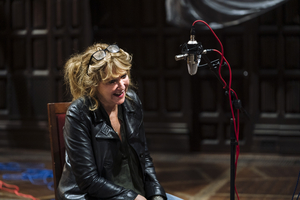Review: 'WHAT I LOVE' WITH SONIA FRIEDMAN, Podcast
Ian Rickson continues his excellent series of interviews with the brilliant theatre producer

![]() In the next episode of the podcast series What I Love, acclaimed director Ian Rickson meets international theatre producer Sonia Friedman, who chooses a favourite song, film and piece of writing to highlight what we are all in danger of losing.
In the next episode of the podcast series What I Love, acclaimed director Ian Rickson meets international theatre producer Sonia Friedman, who chooses a favourite song, film and piece of writing to highlight what we are all in danger of losing.
Friedman began in the theatre as a dresser, working as a stage manager and in an educational department before becoming a producer. After setting up her own company 20 years ago, she has produced nearly 200 shows, including Book of Mormon, Dreamgirls and Jerusalem.
Meeting on the empty stage of the Palace Theatre in London's West End is especially poignant, as this is the theatre where Friedman's wildly successful production of Harry Potter and the Cursed Child was playing to packed houses before the pandemic broke.
Friedman speaks very eloquently about the wide range of deep emotions she felt walking to the theatre and through the doors. She refers to the shock she feels about the industry and her company. One particularly heartfelt reference is to the dirt on the posters for the show; she sees that she could write her name in the dirt. There is a great sadness and sense of loss in this simple observation.
There is a rather profound thought that theatres are waiting. They were here before us and will be here after us, but her concern is; will she be there? Since the age of 15 she has worked in the theatre; it has been an all-encompassing industry for her. That her daily work has been taken away so cruelly is something she is processing.
Rickson is very eloquent in his observations and questioning. He states how Friedmans's role has almost been reversed; her enabling, her building and creation within the industry is now having to encompass redundancies and breaking down parts of what she has created. It is the uncertainty that seems to be most difficult element of the situation for Friedman; June and September were hailed as the return of theatre but now a date when theatre can return seems more fluid than ever.
Friedman's first choice is the song "The Golden Days", written for and performed by her sister Maria. Her unconventional childhood, growing up with three siblings in a chaotic home, meant that Friedman feels she grew up very quickly and developed huge amounts of resilience, which she has carried into her work.
The song comes from a cabaret show that Friedman produced for her sister at the Donmar. The main theme of the song is that despite the fact that the past wasn't always so rosy, she wouldn't change anything. It reminds her of her love for her family and appreciate how strong they are.
When her siblings all left home within six months, Friedman reveals that she went off the rails for a year, playing truant and was eventually being expelled from school. She talks, in a very self-deprecating manner, about her job as bringing out talent in others as she does not have a talent herself for things such as writing, directing or poetry.
Friedman's film of choice is the Pixar animation Inside Out. The theme of analysing and understanding mental health in young people is something Friedman believes is incredibly important. Fundamentally, the message is that you cannot have happiness without sadness. Friedman saw the film and reveals she was an 'emotional wreak' at the end of it; the blue (sad) memories must be acknowledged and can also actually be golden and valuable.
She describes how her role is to be relentlessly upbeat. She is not allowed to show negativity and so must put on an act of sorts, even though she is always trying to foresee the things that might go wrong. Touchingly, she says that she never stops worrying about the people who rely on her.
The conversation touches on Friedman's inability to live in the present, how she cannot meditate, the reality of her memories. It feels private and inciteful. Despite time pressures, what would have been hugely interesting is a little more discussion about some of Friedman's productions. She has worked on some of the the world's biggest shows and must have some great stories to tell.
Friedman chooses Kathleen Raine's poem "Change". This poem was sent to her by Mark Rylance when she was going through a relationship breakdown. It helped her to realise that change cannot be stopped or controlled. She reads the poem aloud; all the more evocative when Rickson points out that it is the only performance that there will be on the stage that night.
There is a great amount of raw emotion and almost melancholy reflection in this episode. The conversation often sounds similar to a therapy session and seems like a cathartic experience for Freidman; embracing change means the future is exciting, even if it is completely unknown.
The What I Love Podcast is available now with more new episodes to follow
Photo Credit: Helen Murray
Reader Reviews
Videos

